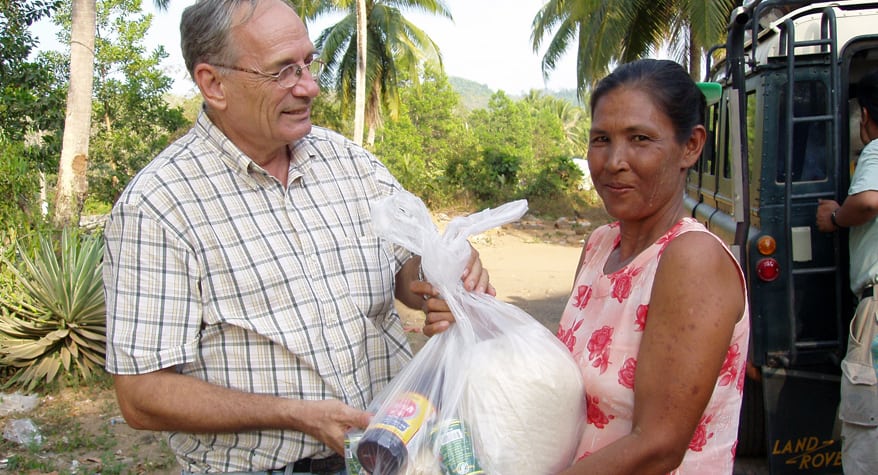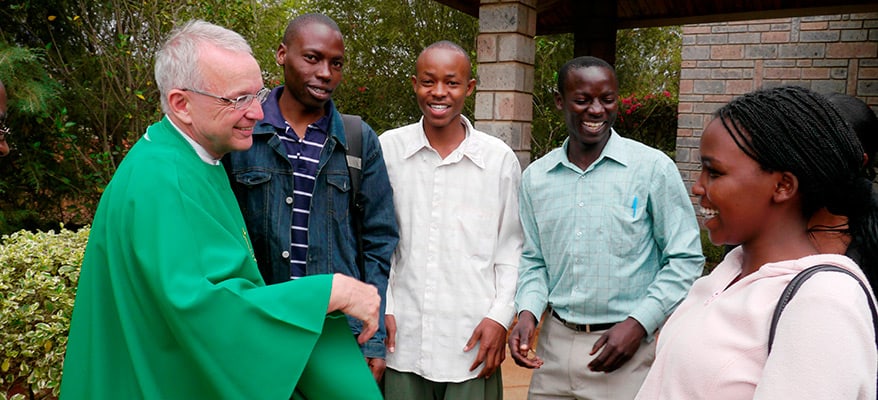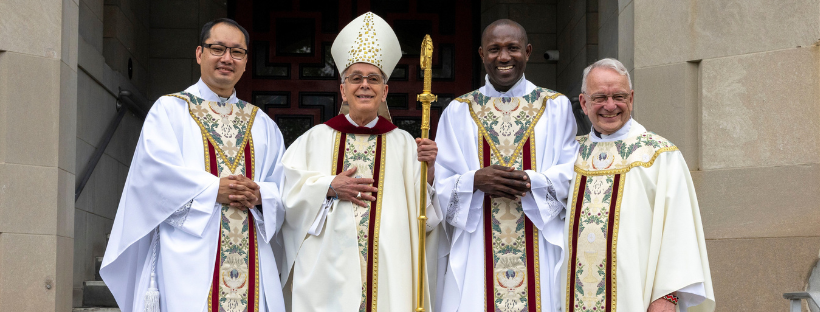A Maryknoll Brother joins a Burmese Archbishop in helping refugees made homeless by a cyclone
Shortly after Cyclone Nargis killed 150,000 people in Myanmar in 2009 and left more than 2 million homeless and hungry, Archbishop Charles Maung Bo, of Yangon, observed firsthand how compassion unites the world’s great religions. “All religious groups were made victims by the cyclone,” declares the native Burmese prelate, who heads the Burmese Catholic Bishops’ committee on interfaith dialogue and cooperation.
“Spontaneous charity sprang forth, with Buddhists feeding Christians and Christians feeding Buddhists,” says the 51-year-old bishop, who is a member of the Salesian Fathers. “In Bogalay, the Hindu temple opened its portals to feed the multitude. In the ravished streets of Yangon, Muslim merchants were distributing food to the starving masses.” The devastating cyclone, Bo explains, taught everyone in Myanmar “that human tears have no color, no religion and no tribe.”
No one could agree more than Maryknoll Brother John Beeching. For the past five years Beeching has worked with Archbishop Bo to promote better interfaith cooperation by sponsoring seminars on the great religious traditions of Asia—Buddhism, Hinduism and Islam—for priests, Sisters and laity in Burma, as the country was known until the dictatorial military rulers changed the name.
“The hunger in Burma,” Beeching notes, “didn’t start with Nargis—it was there already. The cyclone merely deepened it and focused the world’s attention on it—momentarily.” The hunger was so obvious even a year ago that Maryknoll Father Thomas Dunleavy, Maryknoll Sister Mary Grenough and Beeching organized a relief mission, and spent 10 days in Burma working with U.N. staff, Buddhist monks, Muslim leaders and Catholic Sisters and Brothers, providing food to orphanages, schools for poor children and monasteries housing small children in three major locations in Burma.
Immediately after the cyclone, it was impossible to get visas to enter Burma, and the military government strictly controlled shipments of relief goods. But as the situation began to normalize, the Maryknoll missioners responded in a low-key way, again using local Burmese U.N. staff to guide them. Beeching suggested opening a soup kitchen in Yangon to get hot meals out to children, whose families had taken refuge in squatter areas on the outskirts of the city. Two members of Maryknoll’s Thailand team, Margarita Inhumang and Imelda Ortiz of the Philippine Catholic Lay Mission group, agreed to pilot the project, using contacts Beeching had in Yangon to assist them.
Beeching’s interest in interfaith dialogue goes back to the time he spent working in the Middle East, where he was well acquainted with the lives and faith of Muslims. When he took an assignment to Thailand in 1990, he found himself working in Bangkok with Buddhist refugee monks from Burma. Initially, he worked together with monks ministering to war-wounded refugees who had fled fighting in Burma, but his ministry quickly came to involve helping the refugees obtain recognition by the U.N. High Commissioner for Refugees. With a gift for organizing and involving others, Beeching included volunteers, Maryknoll Affiliates and Maryknoll Lay Missioners to assist him in gaining international sponsors for resettling the refugees and in teaching them English in preparation for taking up their new lives.
Beeching’s missionary zeal became known to Bishop Paul Grawng, who invited the Maryknoll Brother to come to Burma periodically to help in the pre-major seminary with English classes and other projects in the northern Diocese of Myitkyina. Beeching agreed and in his usual fashion soon involved Maryknoll volunteers and Affiliates in short-term mission projects there.
The opportunity to go deep into Burma also became the chance for Beeching and some of the Maryknoll volunteers and Affiliates to begin helping the Mon Buddhist monks in Yangon, the capital, located in southern Burma. Some of the monks, who had studied English with Beeching at Wat Prok Temple in Bangkok, established a medical outreach program to assist Mon villagers who needed medical treatment in Yangon. Maryknoll, through Beeching’s periodic visits to the monks, covered the cost. Over the years a warm and lasting relationship has built up between the monks and various Maryknollers.
Beeching loves his vocation and laments that Brotherhood is often underrated. “Somehow,” he says, “we put the emphasis on priesthood, but brotherhood is really the central vocation of the Christian.”
Beeching, who has been a Maryknoll Brother for 40 years, has continued to work part-time each year in Burma since 1996, usually with Maryknoll volunteers and Affiliates, but now also with some of the newly assigned Maryknoll team in Burma, who took up work in 2005. The missioners reach out to all, especially the poor, regardless of religion. Compassion, as Archbishop Bo points out, is a link between all religions—and it is at this level that Beeching and the other Maryknoll missioners in Asia have tried to serve.
Help Maryknoll in our work with the world’s most vulnerable.




